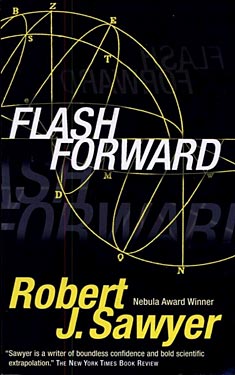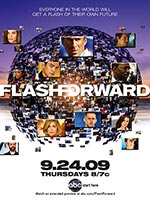
Added By: Administrator
Last Updated: Administrator
Flashforward
| Author: | Robert J. Sawyer |
| Publisher: |
Tor, 1999 |
| Series: | |
|
This book does not appear to be part of a series. If this is incorrect, and you know the name of the series to which it belongs, please let us know. |
|
| Book Type: | Novel |
| Genre: | Science-Fiction |
| Sub-Genre Tags: | Time Travel Hard SF Near-Future |
| Awards: | |
| Lists: | |
| Links: |
|
| Avg Member Rating: |
|
|
|
|
Film & Television Adaptations
Synopsis
A scientific experiment begins, and as the button is pressed, the unexpected occurs: everyone in the world goes to sleep for a few moments while everyone's consciousness is catapulted more than twenty years into the future. At the end of those moments, when the world reawakens, all human life is transformed by foreknowledge.
Excerpt
1
Day One: Tuesday, April 21, 2009
A slice through spacetime…
The control building for CERN's Large Hadron Collider
was new: it had been authorized in A.D. 2004 and completed in 2006. The building enclosed a central courtyard, inevitably named "the nucleus." Every office had a window either facing in toward the nucleus or out toward the rest of CERN's sprawling campus. The quadrangle surrounding the nucleus was two stories tall, but the main elevators had four stops: the two above-ground levels; the basement, which housed boiler rooms and storage; and the minus-one-hundred-meter level, which exited onto a staging area for the monorail used to travel along the twenty-seven-kilometer circumference of the collider tunnel. The tunnel itself ran under farmers' fields, the outskirts of the Geneva, airport, and the foothills of the Jura mountains.
The south wall of the control building's main corridor was divided into nineteen long sections, each of which had been decorated with a mosaic made by an artist from one of CERN's member countries. The one from Greece depicted Democritus and the origin of atomic theory; the one from Germany portrayed the life of Einstein; the one from Denmark, that of Niels Bohr. Not all of the mosaics had physics as their themes, though: the French one depicted the skyline of Paris, and the Italian one showed a vineyard with thousands of polished amethysts representing individual grapes.
The actual control room for the Large Hadron Collider was a perfect square, with wide, sliding doors positioned precisely in the centers of two of its sides. The room was two stories tall, and the upper half was walled with glass, so that tour groups could look down on the proceedings; CERN offered three-hour public tours Mondays and Saturdays at 09h00 and 14h00. Hanging flat against the walls below the windows were the nineteen member-state flags, five per wall; the twentieth spot was taken up by the blue-and-gold flag of the European Union.
The control room contained dozens of consoles. One was devoted to operating the particle injectors; it controlled the beginnings of experiments. Adjacent to it was another with an angled face and ten inlaid monitors that would display the results reported by the ALICE and CMS detectors, the huge underground systems that would record and attempt to identify the particles produced by LHC experiments. Monitors on a third console showed portions of the gently curving underground collider tunnel, with the I-beam monorail track hanging from the ceiling.
Lloyd Simcoe, a Canadian-born researcher, sat at the injector console. He was forty-five, tall, and clean-shaven. His eyes were blue and his crewcut hair so dark brown that one could get away with calling it black - except at the temples, where about half of it had turned gray.
Particle physicists weren't known for their sartorial splendor, and Lloyd had until recently been no exception. But he'd agreed a few months ago to donate his entire wardrobe to the Geneva chapter of the Salvation Army, and let his fiancée pick out all-new things for him. Truth be told, the clothes were a little flashy for his taste, but he had to admit that he'd never looked so sharp. Today, he was wearing a beige dress shirt; a coral-colored jacket; brown pants with exterior pouches instead of interior pockets; and - in a nod to fashion tradition - black Italian leather shoes. Lloyd had also adopted a couple of universal status symbols that also happened to be bits of local color: a Mont Blanc fountain pen, which he kept clipped to his jacket's inside pocket, and a gold Swiss analog watch.
Seated on his right, in front of the detector console, was the master of the makeover herself, his fiancée, engineer Michiko Komura. Ten years Lloyd's junior at thirty-five, Michiko had a small, upturned nose and lustrous black hair that she had styled in the currently popular page-boy cut.
Standing behind her was Theo Procopides, Lloyd's research partner. At twenty-seven, Theo was eighteen years younger than Lloyd; more than one wag had compared the conservative middle-aged Lloyd and his fiery Greek colleague to the team of Crick and Watson. Theo had curly, thick, dark hair, gray eyes, and a prominent, jutting jaw. He almost always wore red denim jeans - Lloyd didn't like them, but no one under thirty wore blue jeans anymore - and one of an endless string of T-shirts depicting cartoon characters from all over the world; today he had on the venerable Tweety Bird. A dozen other scientists and engineers were positioned at the remaining consoles.
Moving up the cube…
Except for the gentle hum of air conditioning and the soft whir of equipment fans, the control room was absolutely silent. Everyone was nervous and tense, after a long day of preparing for this experiment. Lloyd looked around the room then took a deep breath. His pulse was racing, and he could feel butterflies gyrating in his stomach.
The clock on the wall was analog; the one on his console, digital. They were both rapidly approaching 17h00 - what Lloyd, even after two years in Europe, still thought of as 5:00 P.M.
Lloyd was director of the collaborative group of almost a thousand physicists using the ALICE ("A Large Ion Collider Experiment") detector. He and Theo had spent two years designing today's particle collision - two years, to do work that could have taken two lifetimes. They were attempting to recreate create energy levels that hadn't existed since a nanosecond after the Big Bang, when the universe's temperature was 10,000,000,000,000,000 degrees. In the process, they hoped to detect the holy grail of high-energy physics, the long-sought-after Higgs boson, the particle whose interactions endowed other particles with mass. If their experiment worked, the Higgs, and the Nobel that would likely be awarded to its discoverers, should be theirs.
The whole experiment was automated and precisely timed. There was no great knife switch to pull down, no trigger hidden under a spring-loaded cover to push. Yes, Lloyd had designed and Theo had coded the core modules of the program for this experiment, but everything was now under the control of a computer.
When the digital clock reached 16:59:55 Lloyd started counting down out loud with it. "Five."
He looked at Michiko.
"Four."
She smiled back encouragingly. God, how he loved her -
"Three."
He shifted his gaze to young Theo, the wunderkind - the kind of youthful star Lloyd had hoped to have been himself but never was.
"Two."
Theo, ever cocky, gave him a thumbs-up sign.
"One."
Please God…thought Lloyd. Please.
"Zero."
And then -
* * *
And then, suddenly, everything was different.
There was an immediate change in the lighting - the dim illumination of the control room was replaced with sunlight coming through a window. But there was no adjustment, no discomfort-and no sense the Lloyd's pupils were contracting. It was as if he were already used to the brighter light.
And yet Lloyd couldn't control his eyes. He wanted to look around, to see what was going on, but his eyes moved as if under their own volition.
He was in bed - naked, apparently. He could feel the cotton sheets sliding now over his skin as he propped himself up on one elbow. As his head moved, he caught a brief glimpse of dormer windows, looking out apparently from the second floor of a country house. There were trees visible, and -
No, that couldn't be. These leaves had turned, frozen fire. But today was April 21 - spring, not autumn.
Lloyd's view continued to shift and suddenly, with what should have been a start, he realized he wasn't alone in bed. There was someone else with him.
He recoiled.
No - no, that wasn't right. He didn't physically react at all; it was as if his body were divorced from his mind. But he felt like recoiling.
The other person was a woman, but -
What the hell was going on?
She was old, wrinkled, her skin translucent, her hair a white gossamer. The collagen that had once filled her cheeks had settled as wattles at the sides of her mouth, a mouth now smiling, the laugh lines all but lost amongst the permanent creases.
Lloyd tried to roll away from the hag, but his body refused to cooperate.
What in God's name was happening?
It was spring, not autumn.
Unless -
Unless, of course, he was now in the southern hemisphere. Transported, somehow, from Switzerland to Australia…
But no. The trees he'd glimpsed through the window were maples and poplars; it had to be North America or Europe.
His hand reached out. The woman was wearing a navy-blue shirt. It wasn't a pajama top, though; it had buttoned down epaulets and several pockets - adventure clothing made of cotton duck, the kind L. L. Bean or Tilley sells, the kind a practical woman might wear to do her gardening. Lloyd felt his fingers brushing the fabric now, feeling its softness, its pliancy. And then -
And then his fingers found the button, hard, plastic, warmed by her body, translucent like her skin. Without hesitation, the fingers grasped the button, pushed it out, slipped it sideways through the raised stitching around the button-hole. Before the top fell open, Lloyd's gaze, still acting on its own initiative, lifted again to the old woman's face, locking onto her pale blue eyes, the irises haloed by broken rings of white.
He felt his own cheeks drawing tight as he smiled. His hand slipped inside the woman's top, found her breast. Again he wanted to recoil, snapping his hand back. The breast was soft and shriveled, the skin hanging loosely on it - fruit gone bad. The fingers drew together, following the contours of the breast....
Copyright © 1999 by Robert J. Sawyer
Reviews
Images
No alternate cover images currently exist for this novel.



















 Full Details
Full Details










